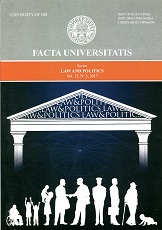Social Reaction to Juvenile Crime
Social Reaction to Juvenile Crime
Author(s): Marijana VučićevićSubject(s): Criminal Law, Criminology, Penology
Published by: Универзитет у Нишу
Keywords: The Act on Juvenile Criminal Offenders and Criminal-law Protection of Juveniles; juvenile; criminal sentences; educational measures; juvenile prison
Summary/Abstract: Social reaction to juvenile crime has evolved over time toghether with crime. In the initial period, juveniles were punished like adults and the primary purpose of punishment was repression, which is quite different today. In terms of punishment of juvenile offenders, our country has accepted the widely used system which is primarily characterised by the protection and education of juveniles. Therefore, the Act on Juvenile Criminal Offenders and Criminal-law Protection of Juveniles introduced educational orders whose primary purpose is to reduce the institutional treatment of juveniles and to contribute to their rehabilitation through their active involvement and improving relations with the victim. To this effect, the most preferable measures are educational measures whose main purpose is to provide assistance, supervision and rehabilitation of minors, and to prevent commission of crimes in the future. The most common educational measures are measures of intensive supervision which imply greater control over a minor by a parents, another family member or the guardianship authority. Institutional measures are the least common because they are the most serious kind of educational/correctional measures. In this system, the punishment of imprisonment is used exceptionally; thus, juvenile imprisonment is the last resort punsihment, which may be applied only against an older juvenile.
Journal: FACTA UNIVERSITATIS - Law and Politics
- Issue Year: 15/2017
- Issue No: 4
- Page Range: 361-373
- Page Count: 13
- Language: English

